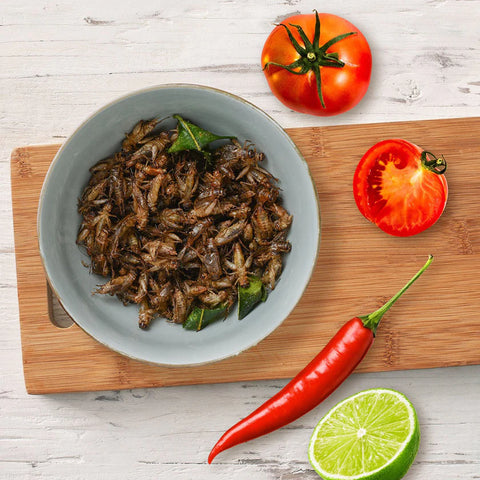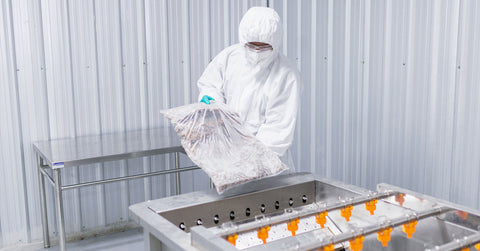Calories are not hard to get, it is vitamins and minerals we are often lacking. Insects are not only sustainable and ethical to farm, they are also very nutritious. And that’s important! Deficiencies of minerals like iron and calcium are not rare, especially as we age. We are also encouraged to get more of those healthy omega-3 fats and increase the amount of fibre and protein we eat. Think of the foods you consider good sources of iron, calcium, protein, and fibre. It turns out that crickets are better when it comes to all of these!
Cricket flour carries twice as much protein as beef
Sirloin beef steak has 27,1 g of complete protein per 100g while cricket flour carries 58,3 g in 100g. And their amino acid profiles and digestibility are very similar both are among the best sources of protein for the human body (1).
Cricket flour has more calcium than milk and more iron than spinach
Spinach, a famous iron rich food only has 3,6 mg of iron in 100 g compared to cricket flour which has 5,9 mg per 100 g. Similarly, milk, a great source of calcium, has 113 mg of calcium in 100 g and cricket flour has 170 mg of calcium in 100 g. On top of that, both iron and calcium from crickets are much more bio-available, even more than the same minerals from beef (2).

Cricket flour contains more fibre than beans
Legumes are a great source of fibre, kidney beans, for example, contain 5,3 g of fibre per 100 g. Cricket flour beats that with 6 g per 100 g. And the fibre in cricket flour is unique because it comes from the cricket’s hard shell in a form polyaminosaccharides chitin and chitosan. Early research suggests that this form of fibre binds to dietary lipids, reducing cholesterol and triglycerides in the body, which is great for prevention of cardiovascular disease (3).
Crickets have a similar amount of omega-3s as salmon
Salmon, cited as one of the best sources of omega-3 fatty acids, contains about 2 – 3 g of them per 100g, depending on the type. Crickets, a source that is not as well known, carry 2,8g of omega-3 fats in 100g.
Crickets are a true superfood, they are full of nutrients, sustainable and ethical to farm, and they can even taste great!
Feed your body well. Try our tasty nutrient dense cricket-based bars!
Sources:
1) Dun Wang et al., ‘Evaluation on Nutritional Value of Field Crickets as a Poultry Feedstuff’, Asian-Australasian Journal of Animal Sciences 2005, https://www.cricketflours.com/wp-content/uploads/2014/07/Value-of-Crickets.pdf
2) Latunde-Dada GO et al., ‘In Vitro Iron Availability from Insects and Sirloin Beef.’, J Agric Food Chem. 2016, https://www.ncbi.nlm.nih.gov/pubmed/27731991
3) Dossey et al., ‘Nutrient Content and Health Benefits of Insects’, In book: Insects as Sustainable Food Ingredients, 2016, https://www.researchgate.net/publication/304714779_Nutrient_Content_and_Health_Benefits_of_Insects



